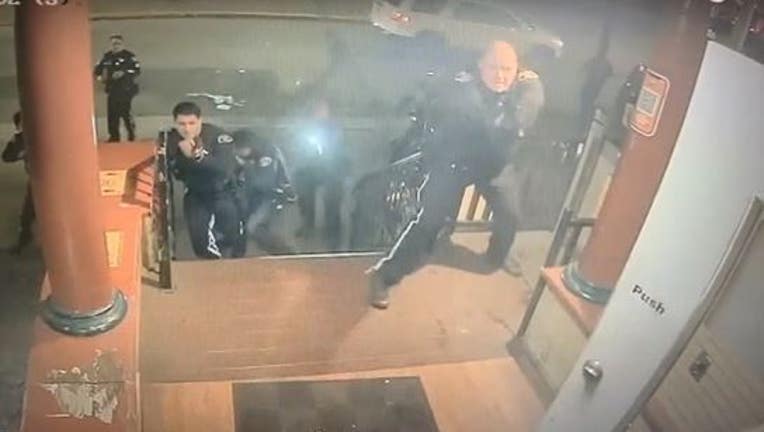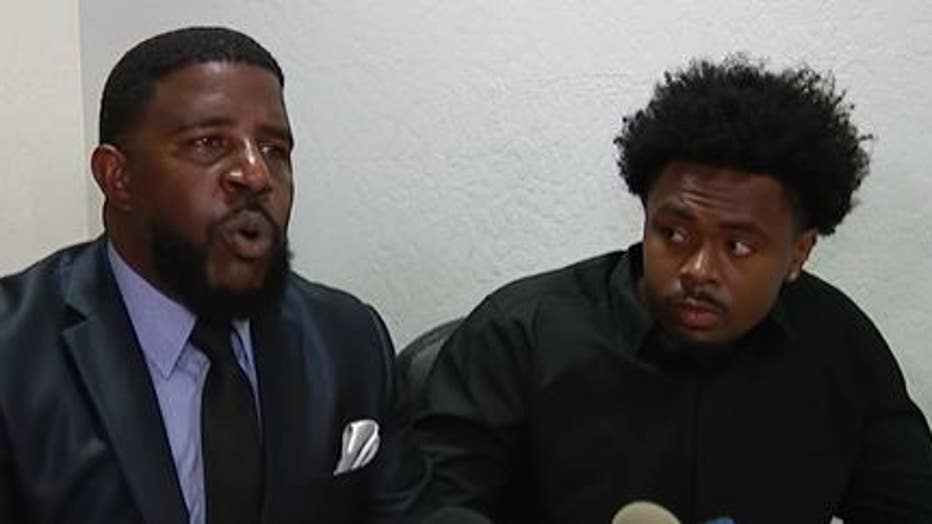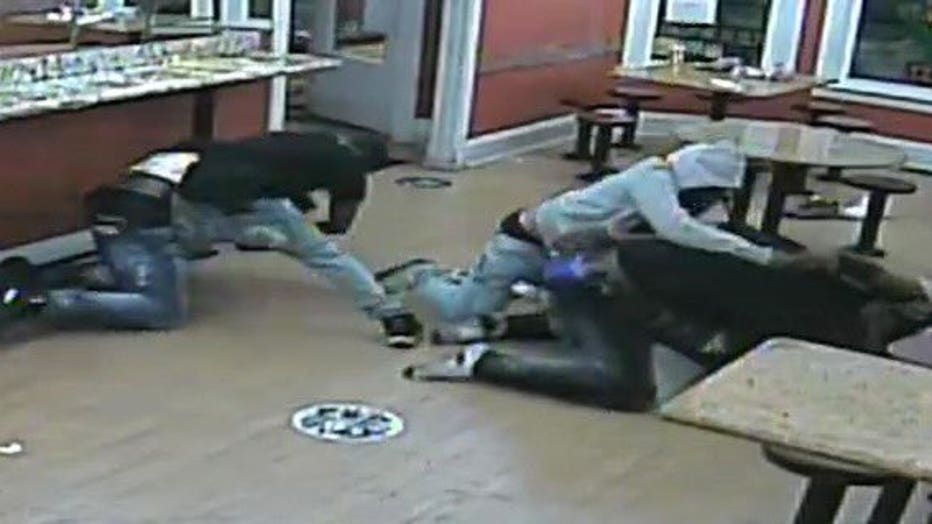Judge orders San Jose attorney, injured football player's legal team to court to discuss racist texts

Former SJPD officer Mark McNamara during the La Victoria Taqueria shooting in 2022.
SAN JOSE, Calif. - A federal judge is ordering the lawyers representing a football player shot by a San Jose police officer and San Jose city attorneys appear in court to sort through how the officer's racist texts will affect a civil case against the police department.
U.S. District Court Judge Nathaniel Cousins told K'aun Green's attorneys and the San Jose city attorney to gather Wednesday in his courtroom to discuss how to proceed in light of a newly revealed police racist text scandal involving former Officer Mark McNamara.
On Friday, the police chief of San Jose made public a slew of racist texts McNamara allegedly sent and were directed at the 21-year-old football player and his legal team, most of whom are Black.
Those texts, some of which the chief released to the public, show McNamara using the N-word and saying he "hates black (sic) people" in several exchanges with one current and one former SJPD employee.
Why McNamara was being investigated has not been disclosed.
The judge also wants to know if McNamara will find a new attorney or represent himself as the city of San Jose will likely no longer represent him, according to a court filing. An email to the San Jose city attorney's office on Monday was not immediately returned.
To date, Thomas Gray, a senior deputy city attorney, has been defending the city of San Jose, and therefore, McNamara, in the case.
Efforts to reach McNamara have not been successful. He resigned on Friday, hours before the chief released his texts.
Meanwhile, the Santa Clara County District Attorney's Office on Monday said prosecutors are "reviewing the evidence" as it pertains to any criminal cases that McNamara would have been involved in. He was hired in 2017.
The Santa Clara County Public Defender did not return requests for comment.
But Karyn Sinunu-Towery, Interim San Jose Independent Police Auditor, told KTVU on Monday that she is pleased Police Chief Anthony Mata "didn't waste any time. He has no tolerance for bad officers."
She said as an auditor, her team is allowed to be present and ask questions during police investigations, but is not able to make anything more public.
Green's lawyers, who held a news conference on Sunday, say the texts – and the racial motivation behind them – are highly relevant as they pertain to what happened on March 27, 2022, at La Victoria Taqueria in downtown San Jose and Green's subsequent federal lawsuit against the city and police department.
McNamara was the only officer to fire his gun and shoot Green.

K'aun Green and his lawyer speak to reporters November 5, 2023 for the first time since the racist text scandal dropped.
Police officials have long maintained McNamara shot Green because he saw a gun in his hand and was worried that he might have been involved in a homicide around the block about a half hour earlier – which it turned out, he was not.
In a video deposition, McNamara testified that upon seeing Green with a gun in his hand, his "first instinct was that somebody is going to get shot and I need to go and stop that from happening. In my mind, the best thing to do was to go over there and see what was going on because of how immediate, that I believed the threat was. There was no time to wait. There was no time to make a plan. The level of urgency was through the roof."
Meanwhile, Green has steadfastly maintained that he was not in the wrong that night; in fact, he acted heroically.
Video shows Green wrestled a gun away from another drunk man inside the taqueria and was exiting the shop with the confiscated weapon just as McNamara shot him four times.
But now, Green's attorney, Adante Pointer, is sure there was a racial element to McNamara shooting his client.
In addition to excessive force, Pointer called for criminal charges to be filed against McNamara including attempted murder and hate crime.
"Racism not only survives within the San Jose Police Department, but thrives," Pointer said.
Pointer's team is relying on the expert testimony of use-of-force expert Adam Bercovici, a 30-year veteran of the Los Angeles Police Department who lives in Bend, Ore., who said that McNamara's use of deadly force "did not abide by accepted police standards and trainings."
Specifically, Bercovici said that McNamara ignored established police protocol, made no attempt to get cover, created a "crossfire situation" when he walked up the stairs of the restaurant and then was "surprised" when the restaurant door opened and Green walked out, placing him directly in a "kill zone."
"That this surprise, created by substandard tactics, created a scenario where he could not assess the threat, and as a result, shot Green, who was responding to commands to raise his hands," Bercovici wrote, according to the Oct. 27 court filings. "Through his actions, McNamara dug himself into a tactical hole which, in my opinion, made him so terrified that he could not recognize that Green was complying with the commands given to him."

Scene on Sunday at La Victoria Taqueria on East San Carlos Street less than a block away from the San Jose State Unviersity campus.
Bercovici called McNamara's tactical behavior that night "reckless, dangerous and completely substandard."
A forensic video expert, Parris Ward, watched the surveillance and body camera videos of that evening, and concluded that Green dropped the gun simultaneously while being shot.
In Bercovici's opinion, McNamara should have established a better tactical position to give clear and calm orders, and waited for direction from his supervisor.
But in this case, Bercovici also criticized the supervisor in charge that night, Sgt. Christopher Bielecki, whom he said failed to establish proper command and control.
In fact, Bercovici said that Bielecki's "deficient" orders in not having a plan when officers approached La Victoria were "an enabling factor" in McNamara's behavior.
"I spent 16 years training subordinate supervisors," Bervcovici wrote. "His assertion that there would be no plan when approaching a call involving a gun is incredulous."
Bercovici said that in his three decades of experience, he could have used deadly force plenty of times, but instead, he realized that using a "well-thought-out plan could prevent a fatal force encounter." These plans should often include "time and distance," and de-escalating the situation with words, not bullets.
Meanwhile, the city of San Jose retained Barbara Riggs, a former Los Angeles Police Academy sergeant and use-of-force expert.
In court filings, she disagreed with Bercovici's opinions, writing that it's not fair to use 20/20 hindsight to second-guess what an officer was thinking in the moment.
Rather, she said, an officer can only judge a situation by the facts reasonably known at the time.
In her opinion, McNamara's actions were "sound."
For instance, Riggs said it was reasonable at the time for McNamara to believe that Green heard him when he said drop the gun, even though Green later testified that he didn't.
Riggs also said that the situation was much more fluid that Bercovici described. Many people were telling police that someone had a gun inside La Vic and they were yelling and screaming for police to come help.
It also was perfectly reasonable for McNamara to have thought that Green could have been involved in the prior homicide at the time – even though it turned out later to not be true, Riggs wrote.
Pointing out other active shooting situations where police stood by and did nothing, Riggs said that it wouldn't have been appropriate for McNamara to wait for Green to have fired the gun in his hand before doing something.
"Mr. Bercovici seems to be suggesting that the officers must wait until a shooting occurs before acting," Riggs wrote. "This tactic would certainly undermine public trust."
Waiting outside La Vic would have left the occupants of the taqueria to "fend for themselves," she wrote.
She also noted that going up the stairs was appropriate because due to the architecture of the restaurant, "no matter how he went up the stairs, he would have been directly in front of the door."
Riggs also defended the sergeant's actions, saying that it's unreasonable that Bielecki would be able to come up with a plan in "three seconds."
The trial is currently set for April 2024.
Lisa Fernandez is a reporter for KTVU. Email Lisa at lisa.fernandez@fox.com or call her at 510-874-0139. Or follow her on Twitter @ljfernandez

